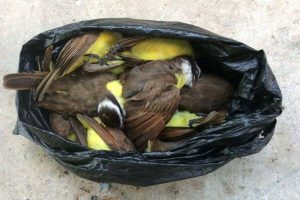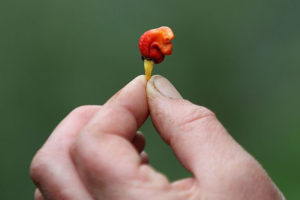
Raindrops keep falling
“It has been raining again. I have been indoors, meditating on the shortcomings of life” is the opening line of a lesser-known poem “Reforming Oneself” by American writer and attorney, Max Ehrmann.

“It has been raining again. I have been indoors, meditating on the shortcomings of life” is the opening line of a lesser-known poem “Reforming Oneself” by American writer and attorney, Max Ehrmann.

A best-selling book by the British writer Michael Brooks, “13 Things That Don’t Make Sense,” looks at the most intriguing scientific mysteries of our time, ranging from cold fusion and the ultimate fate of the universe, to the continuing quest for understanding dark matter and dark energy.

It was late one cold night when I climbed into bed, shivering in the darkness and tucked my hand, as usual under the soft pillow.

We were quietly savouring a traditional Belizean lunch of spicy black beans and fresh salsa when the sudden knocking resumed.

The old jest goes that you can always tell someone is a true Guyanese by their frugal request to the vendor “to pass a single” from the tray or for the bigger order of two cigarettes instead of purchasing the whole pack, like the rest of the world with money to burn.

American stand-up comedian, Jeff Ross is known as the “Roastmaster General” for his withering witticisms and cutting one-liners, delivered during high-profile celebrity appearances on Comedy Central.

The English humorist and writer, Sir A.P. Herbert is well-loved for his realistic series of satirical judgments and absurd legal accounts first set out in “Misleading Cases in the Common Law” which on several occasions were mistakenly reported by several newspapers as entirely factual.

Singing schoolteacher Seadley Joseph so loved books, he became known as the Penguin after the flightless bird symbol of the famous publishing house, winning Trinidad’s coveted Calypso Monarch title with a blistering piece of social commentary, “We Living in Jail.”

We are preparing to leave a lively farmers’ market in the lush, north-eastern hills recently when our daughter rushes up smiling broadly and bearing in both hands a huge, golden present that she excitedly thrusts at me.

I awoke early one morning, with a vague sense of increasing unease, to the sharp, insistent barks of our first, feisty Antiguan Chihuahua mix, faintly audible in the deep gloom below the rumbling rains ramming the galvanised gabled roof.

Under the stars, in the low scrub and up among the vegetation the occasional firefly flashed by, darting in the sweltering darkness as the warm waves rolled in with rare ferocity, crashing along the curving shore of the beautiful bay dotted with small boats and cool caves.

Guyana’s most famous poet Martin Carter wrote the immortal lines “but a mouth is always muzzled, by the food it eats to live” in 1969, and soon after, disillusioned and disgusted by his own short stint in the country’s authoritarian Government he finally resigned, remarking in a Sunday Graphic piece that he wished to live “simply as a poet, remaining with the people.”

The long mournful wail of the conch shell would startle us awake on certain cold mornings, as the “Fish Man,” the first of the village peddlers arrived.

As carefree children dancing in the magical moonlight during hot nights of electricity blackouts, we would gaze up in wonder at the full glowing orb and compete to pinpoint the fabled “man on the moon.”

With a slight pebbly surface, diminutive size and deep orange, red and yellow folds, the latest member of horticultural royalty seems to hardly deserve a second glance.
The famous Dutch surrealist Hieronymus Bosch, “the creator of devils,” left behind only a small but genius body of deeply original work crammed with disturbing symbolism.

The touching tableau of six slender bronze statues with their simple ship bundles, envisioned by two of Guyana’s leading artists should have been standing in all of its shining glory a week ago to commemorate the historic May 5 1838 arrival of the first East Indian indentured immigrants.

With patches of rust scattered along the dull maroon waterline, ugly streaks on the small white cabin, and paint flaking off its faded black hull, the fishing trawler seemed a most unremarkable, dingy vessel that for years, slouched low in the open at its mooring, next to the stone walled ruins of the Curacao Trading Company complex.
Glance at any map of the Caribbean and one cannot but notice the distinctive arc of the small islands elegantly sweeping the blue sea.
The Tsimane or Chimane people are an isolated, indigenous tribe who maintain their tough, subsistence traditions in a remote area of Bolivia’s Amazonian lowlands, faithfully foraging and farming in small, rural settlements along the Maniqui River, like their ancient ancestors.
The ePaper edition, on the Web & in stores for Android, iPhone & iPad.
Included free with your web subscription. Learn more.